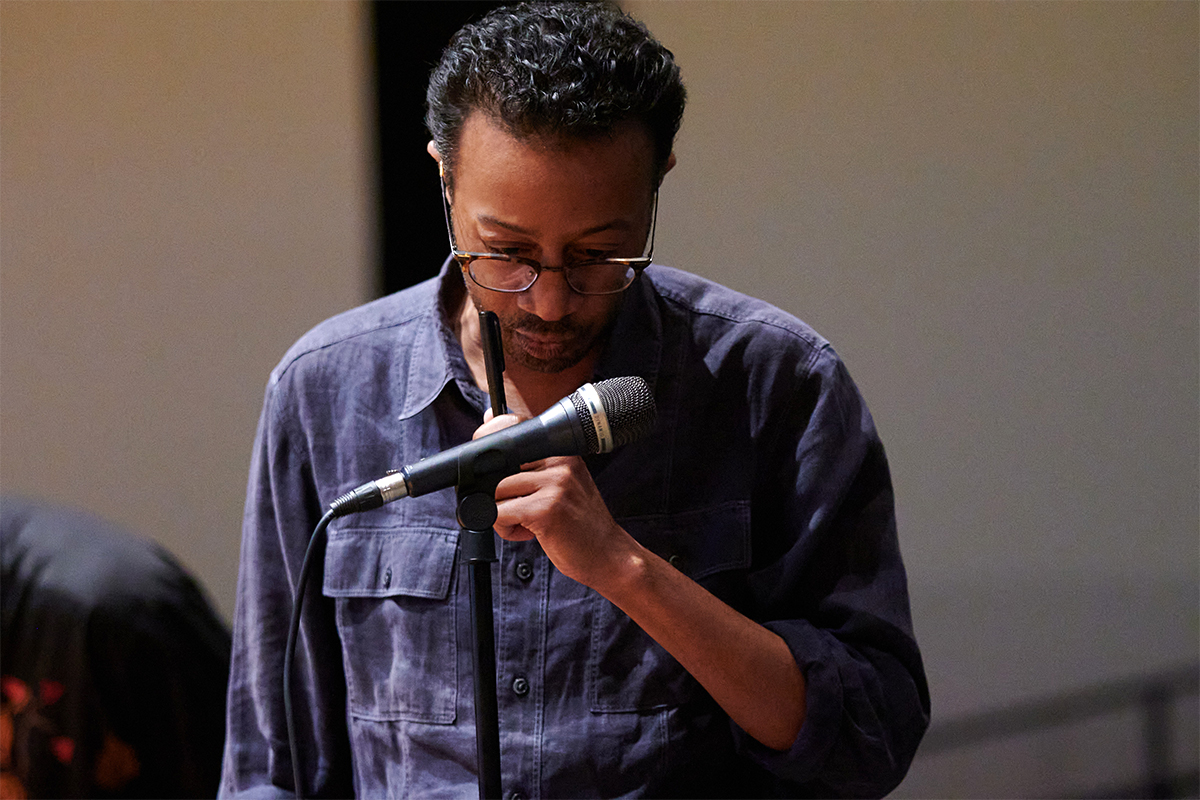In 1983, 7-year-old Tiffany Jefferson waited backstage at the Civic Center Music Hall in Oklahoma City, Okla., with her brother and grandmother to meet Lena Horne—an opportunity the children’s uncle, who worked in the entertainment industry, had facilitated. Jefferson was brimming with anticipation to meet a figure from one of her favorite movies of all time, “The Wiz.”
Adorned in a blue dress with long bell sleeves that hung below when she raised her hands, Horne had a vibrant smile and was nice to her, Jefferson recalls. The young girl could not fully process the interaction as she was so enamored at the thought of meeting Glinda the Good Witch, whom Horne played in the film.
The moment did not last forever, though, as Horne left to prepare for her show, “Lena Horne: The Lady and Her Music,” a musical. Jefferson’s parents had gotten tickets to the performance and backstage access, giving Jefferson the opportunity to meet her idol.
The Oklahoma native saw the movie for the very first time at age 3. Even today, she can recall how the visual details and the energy of the film left a mark on her. While she could not articulate her feelings at that time, words encapsulating how meaningful that viewing became for her now flow easily.
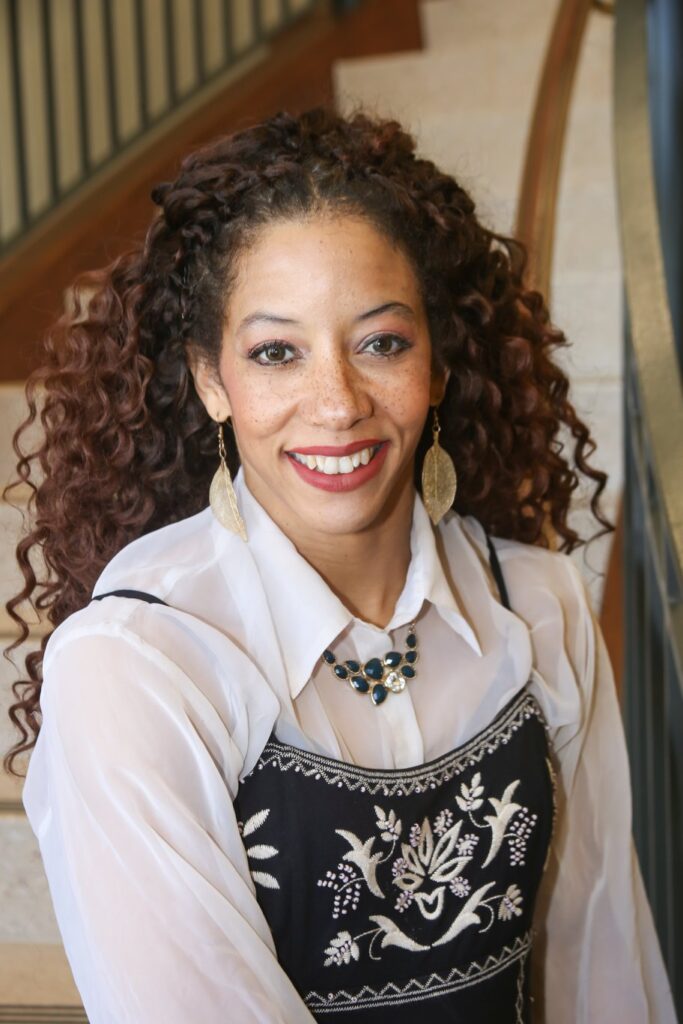
“I can describe it now, just the movement, particularly of Black dancers dancing. The high quality and prowess was just captivating for me, even as a preschooler toddler,” Jefferson told the Mississippi Free Press.
In addition to thinking that Lena Horne looked beautiful in her role as Glinda the Good Witch, Jefferson vividly remembers how the film’s fanciful colors engaged her. That impression was particularly true in the scene where Dorothy and her comrades make it to Emerald City to ask for an audience with the Wiz, only for people singing and dancing to greet them—all while the colors of their outfits change to correspond with the Wiz’ mood.
“I think the way they embodied the colors, it was just like red became sultry, and it was smooth,” Jefferson said of the scene. “It was probably sexy. I don’t think I saw it that way (as a child). I loved green. That’s my favorite color. It was full of light and vitality and creativity.”
“And gold, that’s what I want heaven to look like,” she added. “(I) should be able to walk in, and it’s this huge choreographed dance, and everybody’s in gold. Just this perfect place.”
‘The Best $250’
As a student, writing was not always her strongest subject, Jefferson admits. She liked stories, but she believed they were told better through visual mediums such as dance, since actions can sometimes speak louder than words alone, a conclusion she came to in part because of movies like “The Wiz.”
“When it came to reading and linguistics, I struggled a little bit, and I had to admit I was embarrassed at the time,” Jefferson told the Mississippi Free Press. “It was really through the artform of dance that I got a chance to understand the comprehension of (storytelling) because I was more kinesthetically intelligent. You can tell if a person’s kind of telling the truth by their body language.”
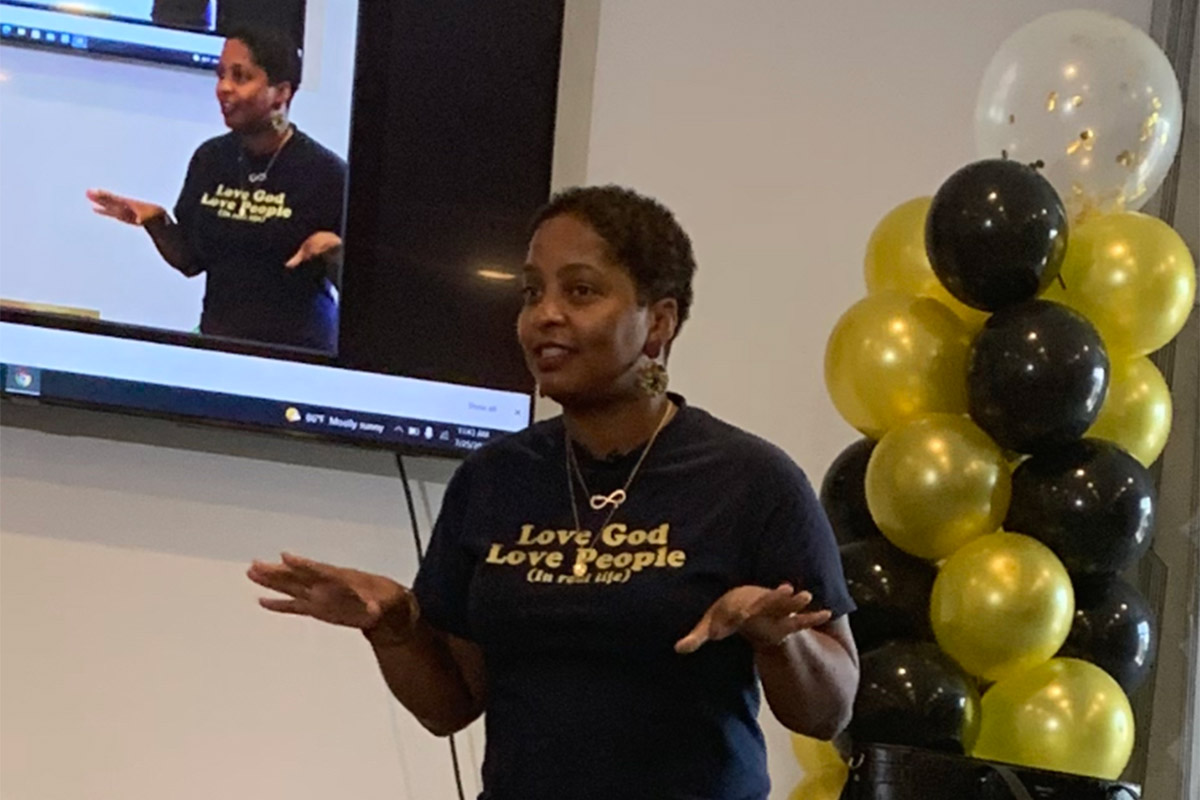
After receiving her master’s degree in dance education and performing for various professional dance companies, Jefferson learned that ballet told narratives, but she found it limiting in scope and movement.
“I never thought that a ballet dancer could portray the scarecrow. I thought that that clearly should have been a hip-hop dancer, a break dancer because of his loose movement,” she explained. “He’s made of straw and in my mind, it just made sense to me. The tin man should be a tap dancer; I mean, he’s made of metal. The cowardly lion should be a jazz dancer; that’s just catlike movement all day long.”
“So within that concept of different dances leading the characters, you get a richer character within your story versus simply just using ballet,” she added.
With all the dancing she has done, Jefferson started re-imagining classic works like “The Nutcracker,” but with a nontraditional perspective.
“You’ve got your great beginning, middle and end. You’ve got great characters. You’ve got a great plot. You have conflict. You have resolution. You have all those things,” the dance director said. “However, it’s not full enough, and so therefore, I’ve always had a unique perspective within my storytelling, whether it be different genres of dance or the African American perspective.”
Jefferson presented her story ideas at the BEE Pitch Camp at the Jackson Film Festival on July 27, 2022. The Jackson Film Festival is an annual event that celebrates independent filmmaking and provides educational training with industry professionals, classes from experts on specific subjects and community-outreach efforts.
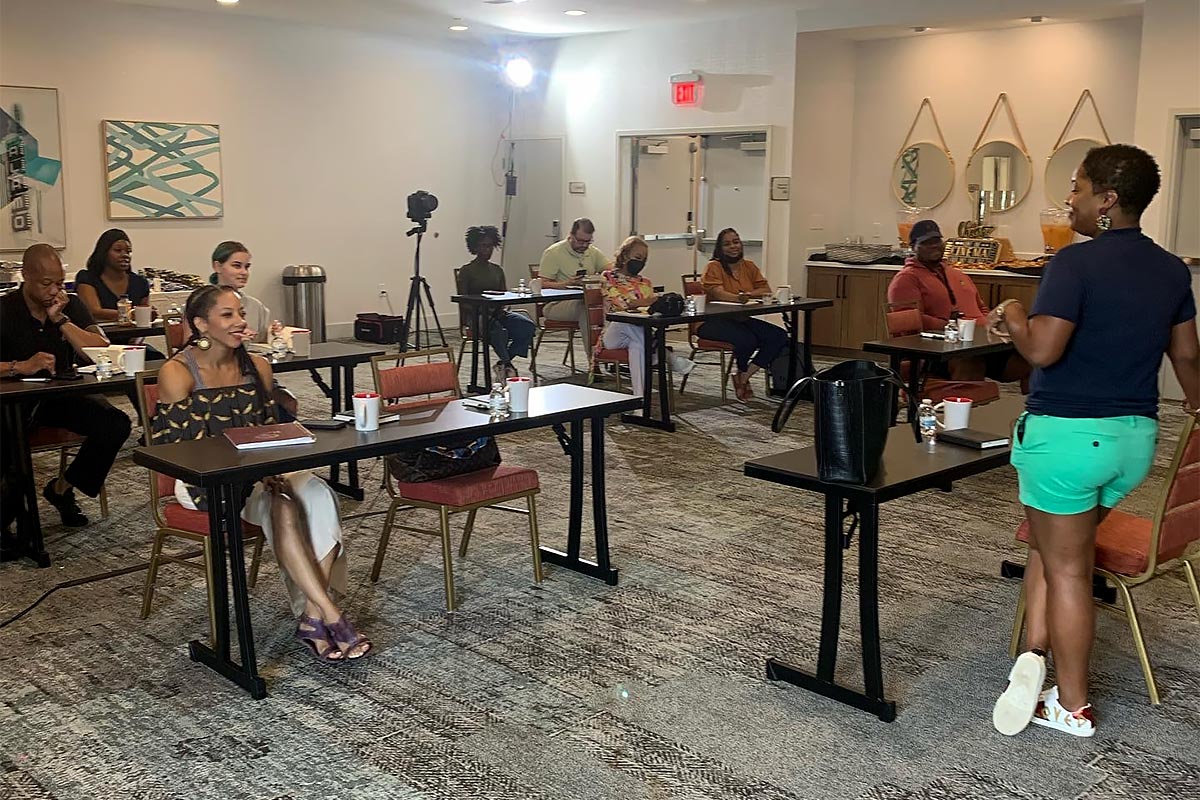
We TV Vice President of Development Ashley McFarlin instructed aspiring writers, actors, and filmmakers participating in the pitch camp on how to craft stories and pitch their ideas to networks over a three-day period. After giving examples of pitches she has received, McFarlin opened the floor up to hear pitches before the class let out.
Jefferson almost did not attend the pitch camp due to the price of attendance, which was $250. She tried to talk herself out of attending, opting to spend the money on buying shoes or backpacks for her children since school was about to start, but fate seemed to have other plans.
“It was literally that morning I contacted Maximus. If it was full, then I knew it wasn’t meant to be,” Jefferson said. “And so I asked, ‘Is there any space left?’ and he was like, ‘Yeah.’ I was like, ‘Well, crap, now I gotta go,’ and I do not regret it. That was some of the best $250 I could have spent in a long time,” Jefferson said.
After Jefferson presented her ideas in the class, McFarlin asked Jefferson to type and send her those ideas to her via email, which Jefferson did the following morning. The two met a week later to discuss Jefferson’s story ideas again, and McFarlin helped Jefferson learn which areas she needed to improve.
“Ashley kept it real. Some ideas she was not interested in, and I did not take it personally, but she was grooving on a couple of ideas,” Jefferson said. “So, (we went over) how to pitch it to the network before November. I got a lot of work to do.”
‘If You Can Build a House, You Can Build a Set’
The week-long Jackson Film Festival includes film screenings, pitch camps, acting and writing classes, and a black-tie awards gala.
The festival kicked off on Sunday, July 24, 2022, with a VIP reception at the Homewood Suites by Hilton Jackson Fondren Medical District. Ashley McFarlin hosted three BEE Pitch Camps from Monday through Wednesday at the same hotel.
On Tuesday, July 26, the festival premiered short films, music videos, audition tapes, documentaries, comedies and other projects at the Malco Grandview Theater in Madison, Miss.
Sisters Katie and Brett Ball were premiering a snippet from their upcoming documentary, “Planted,” which they started working on six years ago. They were originally filming the sisters’ great aunt to learn more about their family history, but the project eventually morphed into entirely different.
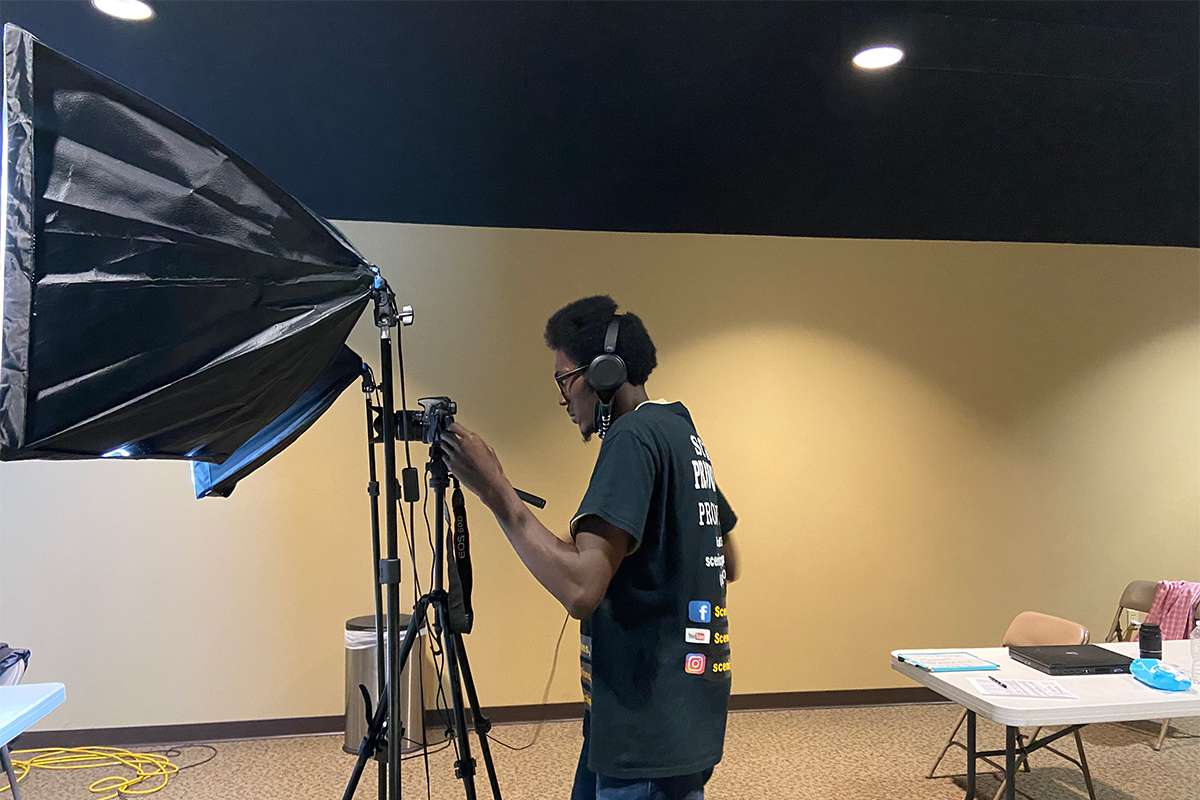
“Our aunt passed (away) in the middle of the project, and then from there, things just evolved,” Katie Ball told the Mississippi Free Press. “We started asking our aunts questions, and they started going into details about their own personal experiences.”
The Ball sisters noticed some overlap between their own experiences and that of their aunts. Though they come from different generations, both used the same coping mechanisms, which became a focus of the movie. The Ball Sisters are creating the film under their production company, Loud Silence, which they founded in 2014.
Kensley C. Keys also attended the film screening, excited about the premiere of a movie he directed and wrote called “THIS Position.”
“The film is about a journalist. He just graduated college. He moved away from town to pursue other things. Then he decides to move back to his hometown,” Keys told the Mississippi Free Press. “Well, he wants a job at his hometown news station, so he’s looking for jobs.”
Because he filmed during the height of the pandemic in 2020 and 2021, one of the biggest challenges Keys faced was finding locations to safely film a large group of people amid health concerns. Keys lost a location a week before filming and asked his actors if they knew anyone who would let him film.
One actor recommended Keys ask his pastor if he could use the church to film. The director got the green light from his pastor, who told him he could use whatever he needed.
“I looked around my church. I never knew my church was this huge,” Keys said. “So everything was shot at my church, and it was a wonderful experience. Everything fell together.”
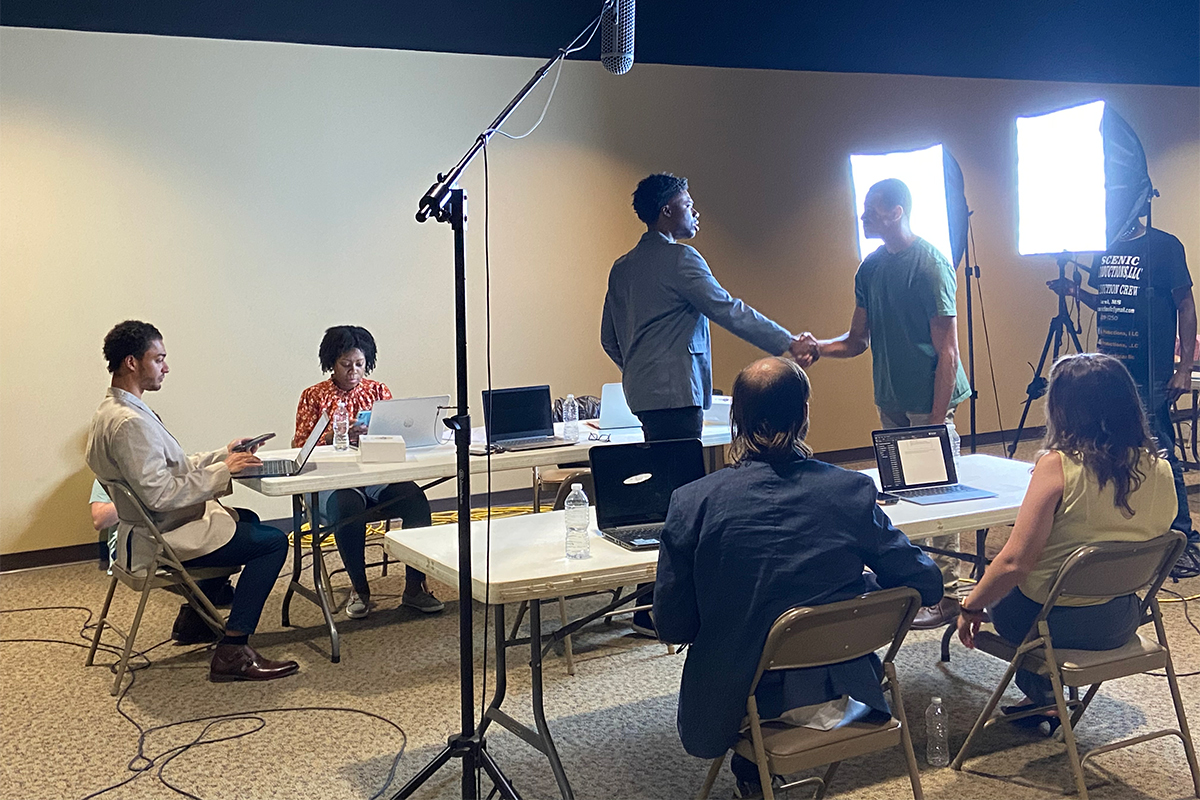
Before the premiere began, festival organizer Maximus Wright told the audience that he believes Jackson has the greatest pool of talent in the world and that they just lack training. The festival is committed to bringing training to the city and creating resources so people do not have to leave the state to make money in the industry, he said.
“If we make the best food in the world, you can’t tell me we can’t do craft service,” Wright said. “If you can build a house, you can build a set. If you can wire a house, you can wire a set.”
“That’s my approach for the workforce-development thing,” he added. “That is gonna be a very real political force that we are pushing, that we are gonna make transferable skills from the people in the workplace to make that available in film.”
He announced that Ashley McFarlin would be coming back in subsequent years to host her pitch camps for the festival and that next year she’ll be bringing other executives with her as well.
‘Your Reputation Matters’
On Wednesday, July 27, the third and final day of Ashley McFarlin’s BEE Pitch Camp focused on the pitching process, how a creator presents their ideas for film or television to a panel of executives. Chivon Ferguson and Carlos King joined the class via Zoom to share some advice and discuss their experiences in production.
Ferguson, a producer, said she likes to use mnemonic devices to help her remember things and when it comes to pitching. The word “pitch,” for her, means to pick interesting topics and convey them honestly.
“So let’s start with the first three; pick interesting topics. The topics have to be interesting to the audiences of the networks that you’re pitching,” Ferguson advised. “Before you start pitching, do your homework. Always look at the shows that they have. Look at the shows that aren’t there anymore and see the ones that were only there for a season or two.”
Kingdom Reign Entertainment CEO Carlos King said when people pitch to him, he likes stories with originality and enjoys working with regular people whom he believes could become stars. He is always looking for a story that he has never seen before.
“One thing I will always let you guys know is that your name matters, your reputation matters, and you have to do what works best for you,” King told the class. “You can’t be a carbon copy of someone. You can’t sell your soul to make a quick buck because one thing I will guarantee you: You will always fail.”
Then, later that same evening at 6 p.m., Wright hosted a writing class.
“I’m going to give y’all the crash course of becoming authentic writers,” Wright said. “Regardless of if you are writing a script, a novel, or you are just writing an essay or writing a new column in the church newsletter.”
“I want you to write your deepest, darkest secret,” Wright told the class. “And you have three minutes.”
Fear and anxiety filled the banquet room at Homewood Suites like an unexpected midnight fog, as each participant’s eyes darted across the room to one another. Reading the room, Wright made it clear to everyone that they would not have to share these thoughts. Once time was up, Wright reiterated that he did not want to hear their secrets but that he wanted them to tell him the feelings they experienced while writing about them.
Anxiety. Fear. Guilt. Honesty. Relief. Liberation. Everyone agreed that despite the many feelings stirred up, writing them down was a struggle in itself. One woman commented that the hesitance stemmed from the fear of wondering who would find it and read it. Each participant shared that same sentiment.
“Now, I want you to take that deepest, darkest secret that you just wrote, and I want you to write the ending that you would want it to be,” Wright instructed. “It could be any ending you want. There’s no limitations of money, there’s no limitations in the time space continuum,” he continued. “You literally can make it whatever you want it to be. Rewrite that ending and you have three minutes.”
Cory Pearson, a Meta product designer from the Mississippi Delta, spoke on Thursday, July 28, and presented Horizon Worlds, a social experience where people can explore, play, create and discover new places through virtual reality. People can create spaces that replace pitch meetings, where people can share their ideas and visions in real time.

On Friday, July 29, actors Tommie Tonea Stewart and Chris Palmer held a class at the Jackson Convention Center. Stewart zoomed into the one-hour session, while Palmer hosted. Dr. Stewart taught students an acting technique she learned from Frank Silvera called “being.”
Frank Silvera started the American Theater of Being to help African American actors understand that they are complete and perfect and that they do not have to grin, scratch their head and buck their eyes to perform, Stewart explained.
“What Frank Silvera teaches in the American Theater of Being is to try to search for the truth,” the Greenwood, Miss., native elaborated. “You’re looking for truth. You’re looking for purpose and meaning—not your meaning, but the character’s meaning.”
Brendan Stevens attended the class and performed a monologue for Dr. Stewart, where he received feedback on his body language and pacing. Stevens, whom Acton Talent Agency represents, had done some work as an extra for a film that was shot in Mississippi.
“I learned it’s so many moving parts to making a movie,” Stevens told the Mississippi Free Press. “(From) the background to the actors, to the director, to the producer, to the PAs—everybody’s important. So you have to give your all at all times because what we see as an audience, it’s like a final product, so if any part is lacking, it’ll show up.”
‘There Are More Filmmakers Than Me’
The Motion Picture Association reported that the film industry supplies $2.2 million in total jobs in the United States. The national industry is comprised of more than 110,000 businesses located throughout every state in the country. These businesses are mostly small businesses, 80% of which employ fewer than 10 people.
The industry has spent $27 billion in payments to more than 359,000 locally owned businesses located across the U.S. A major motion picture shooting on location contributes approximately $250,000 a day to that local economy. For a single one-hour TV episode shooting on location, it contributes $150,000 per day to the local economy.
In Mississippi, the motion picture and television industry is annually responsible for more than 2,900 jobs and pays more than $160 million in wages per year on average—310 or more jobs relating to production, including local production, and 2,590 jobs related to distributing movies, TV and other video mediums to consumers.
In 2020, studios filmed four movies and six TV series in the state of Mississippi, not counting independent films. In 2021, studios filmed 11 movies and four TV series in the state. Mississippi’s film-incentives program includes a 25% rebate on non-payroll investments for production spending at least $50,000 in-state and a separate employment rebate of 30% for in-state residents and an additional 5% for wages paid to veterans for qualified productions. The per-project rebate is capped at $10 million, and the annual amount of available rebates is capped at $20 million.
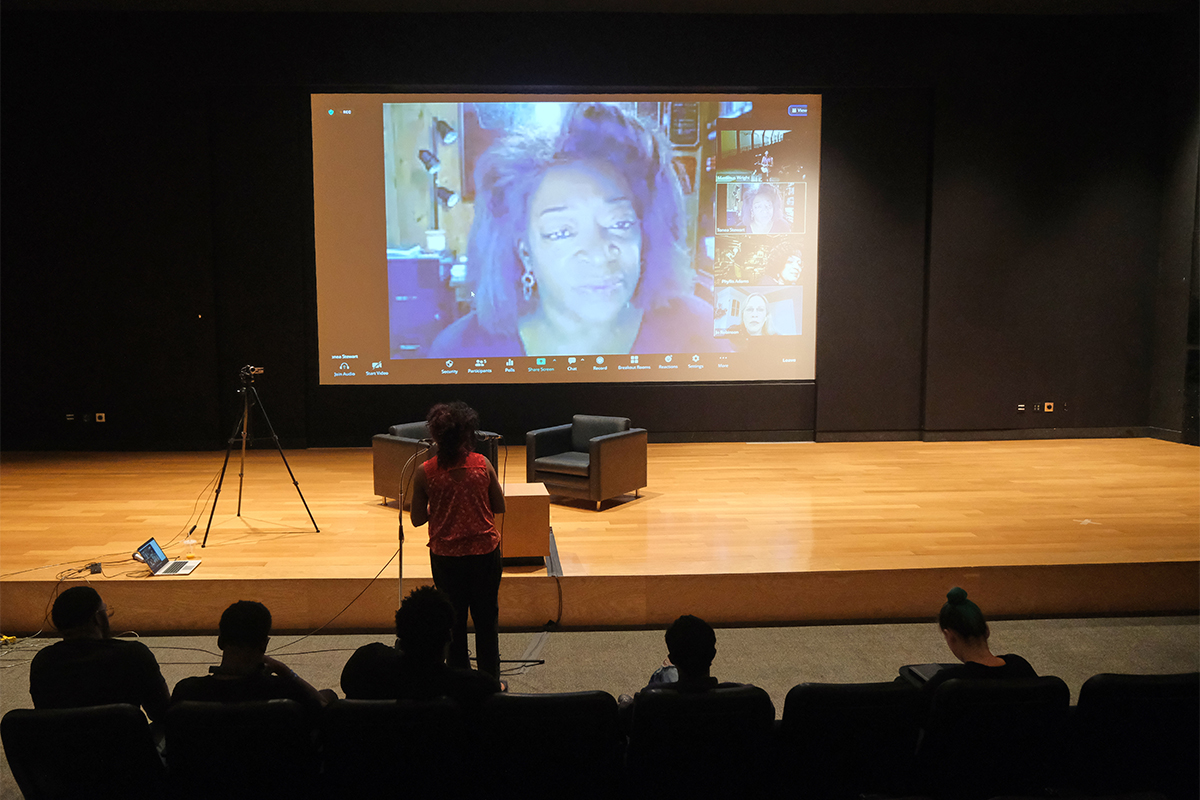
Jackson Film Festival organizer Maximus Wright said the biggest problem that Jackson has regarding the film industry is that the capital city does not have enough filmmakers. He started the film festival because he felt like he received a disproportionate amount of attention, and he wanted to share that public appreciation with other creatives in the city.
“The first year they had Tech Jackson (stylized as TECH JXN on its logo), they showcased my work. I was pleased. I was thrilled,” he said.
When Tech Jackson approached Wright again, Jackson’s Chief Administration Officer Dr. Robert Blaine told him, “We want you to show your stuff again,” Wright recalled.
“They’re more filmmakers than me,” Wright responded at the time. “Why don’t we just make a film festival?”
Wright received approval and collaborated with Tech Jackson in 2020 to create the festival as a virtual event. Then, Wright and his team struck out on their own and launched the first in-person festival in 2021 at the Jackson Convention Center.
“This is my effort. This is my proof of collaborations here, that I’m trying to bring more filmmakers together and create more filmmakers,” Wright said.
When Wright pivoted to directing, he did not have a source for instruction in Jackson to look toward. He had to figure it out, trust his instincts and his drive. He did not attend film school, so at times, others did not see him as a qualified enough filmmaker to be part of the industry. Wright eventually found individuals with similar passions. He now shares all he has learned with others looking to enter film when he can.
“I think some people just have a backwards understanding of that,” he said. “They think if I just hold on to what I got, if I don’t share what I know, if I don’t put you on, that kind of protects me. I don’t believe it. … I wanna see people do well.”
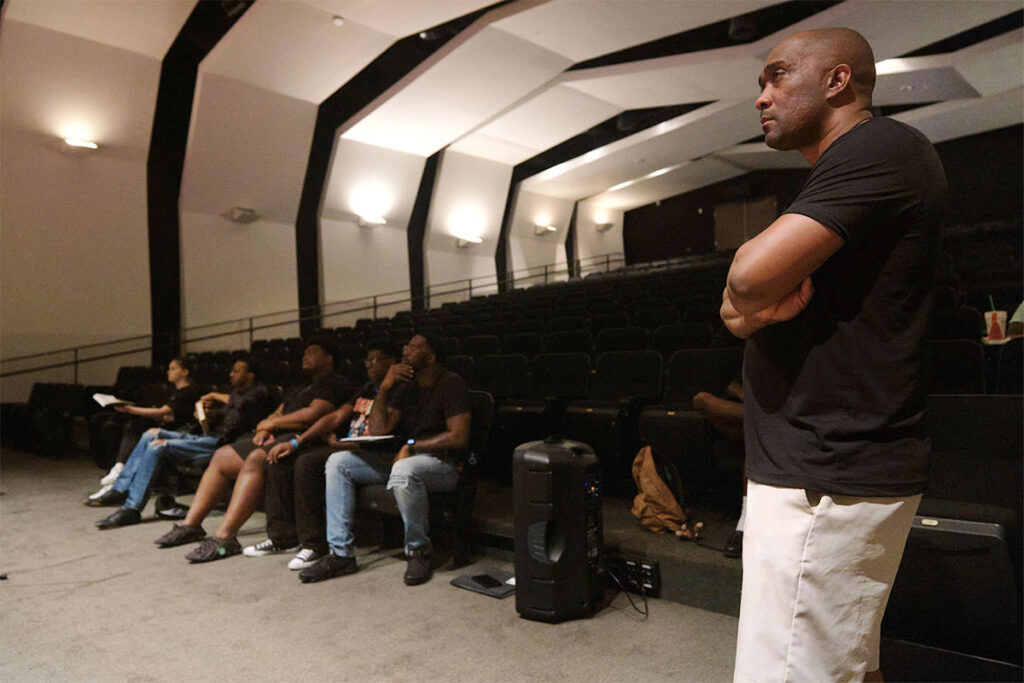
Rather than basking in his own success, Wright wants to help build and encourage filmmakers to produce in Mississippi. If he can help 15 filmmakers establish themselves in the state, he says, then the industry will be forced to come to Missisisppi instead of holing up in Hollywood.
“That’s all I’m doing. I’m just trying to make the ground fertile enough that they’ll come to us cause it’s almost impossible to go to them,” the filmmaker expressed.
‘Employed Year-Round’
Mississippi Film Office Director Nina Parikh, who has been working there for 24 years, said Mississippi is fortunate to typically have at least one feature film shot in the state per year. However, the last two years have been the busiest in the office’s history, she said.
“In 2020 and 2021, there were 25 feature films, and that does not include other projects like television shows, reality shows and commercials,” Parikh told the Mississippi Free Press.
The film office director said the increase in film projects in the state can be attributed to multiple factors such as the state’s rebate program and its friendly and supportive communities, she said. These positive experiences have led producers to return to Mississippi to shoot multiple films.
The rebate program asks that the production company fulfill at least a minimum of 20% of jobs with local residents. This percentage will increase as the state’s crew base continues to grow.
“They’re hiring people locally, and those people are able to deliver what they need; they’re hard workers,” Parikh said. “The individuals that are working on these projects are certainly a testament to why producers are considering Mississippi now.”
The film industry can affect every part of the economy, she said. For example, hotels make money from housing the crew, restaurants benefit because they are catering two-to-three meals on set per day, and gas stations earn revenue from the many vehicles on set, the film director explained.
“A series like ‘Hometown,’ which is filmed in Laurel, Miss., they’ve just completed season six—they’ve transformed their whole town,” Parikh said. “They’ve renovated all these homes in Laurel. They’re on television nationally and internationally, so people all over the world now have this interest in Mississippi and buying houses here.”
“Hometown” is a show on HGTV where husband-and-wife duo Ben and Erin Napier add modern and affordable updates to historic homes in their hometown of Laurel, Miss. Parikh said the couple has renovated about 70 to 80 homes.
Natchez, Jackson, the Gulf Coast and the Delta are also popular for production companies. Natchez Mayor Dan Gibson told WLBT that filming brought in $5 million to $8 million dollars in revenue for the city.
The film office supports all the film festivals that take place across the state, including the Jackson Film Festival’s pitch camp, which they and others sponsored.
“Festivals are very important for Mississippians. There are people who got to learn from professionals, so that’s great professional development and education for our residents,” the film office director said.
In the next five years, Parikh would like to see more Mississippians staying in the state to work and not relocating to get production work. “I’m really hopeful that we’ll be able to have enough work across the state to keep people employed year-round in the film industry,” she said.
‘Cater to Our Base’
This year’s Jackson Film Festival has shown that the event is more regional than they anticipated. Looking back at the numbers, Wright and his team found that a good number of people came from outside the state, some staying for the entire week.
“It’s starting to become that destination thing that we were looking at,” he said. “Some of the calls that we’ve gotten, they’ve mostly been people from out of state (saying) we can’t wait to come back to Jackson, Miss.”
Wright said they also found that 85% to 90% of the festival base is comprised of women. With that in mind, his team wants to create a women summit in film because, though he can teach film, he cannot tell women how it feels to be a woman in the film industry.
“I think we have to start doing things that cater to the people who make up the majority of the base, and at this point it’s women. So, we’re in the process of creating a summit, whether it be part of the festival or separate,” Wright said.
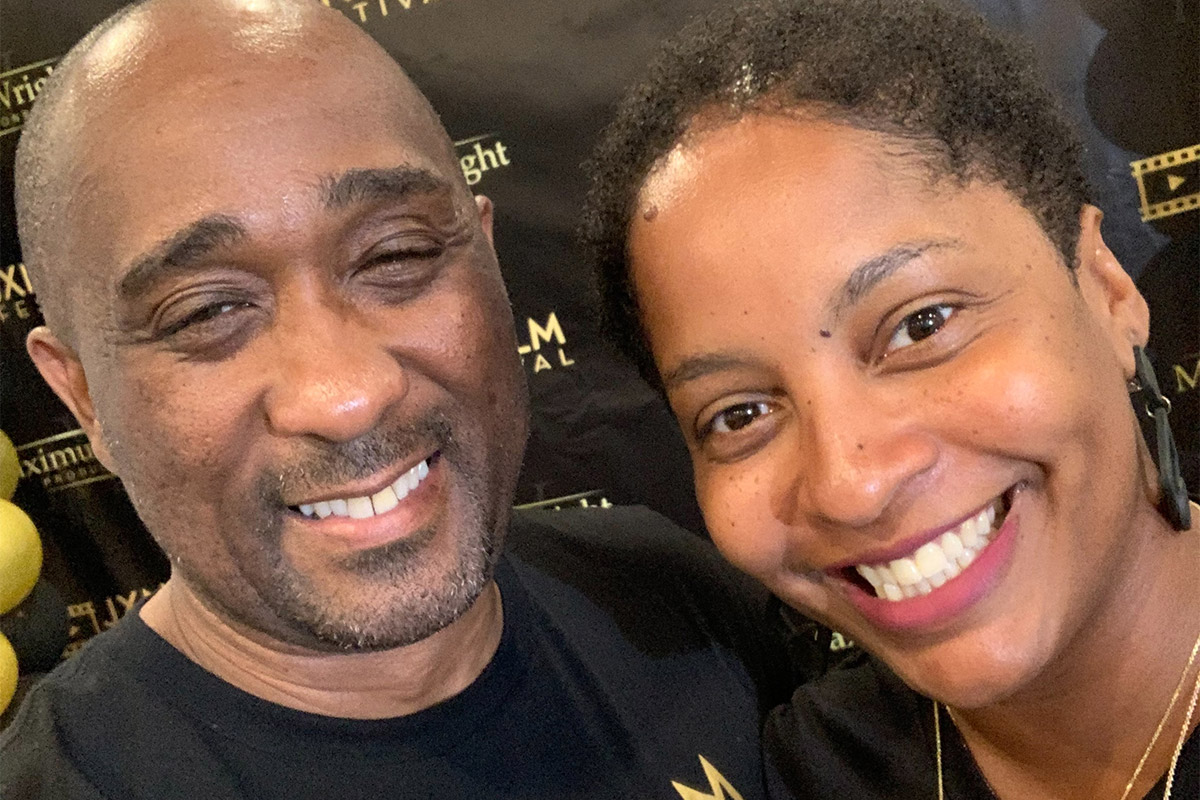
One thing Wright said he would do differently next year is start marketing earlier so that more young people will be able to participate in the events. It broke his heart to see the lack of them present for Cory Pearson’s Horizon Worlds presentation.
“I think we’re gonna have to start reaching out earlier,” Wright surmised. “I think we’re gonna start creating those relationships with those schools while they’re still in session, the colleges and letting them know that this is gonna be leading up to the summer. And maybe do some subsequent events with Corey leading up to it.”
Additionally, he sees a need to incorporate gaming into next year’s festival due to opportunities available in the gaming industry from scholarships to designing and writing opportunities.
“Our kids don’t know that this is an opportunity, so to infuse metaverse gaming technology, I think that makes sense,” the director said. “One of the things that kids don’t realize is that you can get paid to write the scripts for those games because those games have back stories.”
For more information on the Jackson Film Festival, its programs and upcoming news, visit jxnfilmfestival.com.

